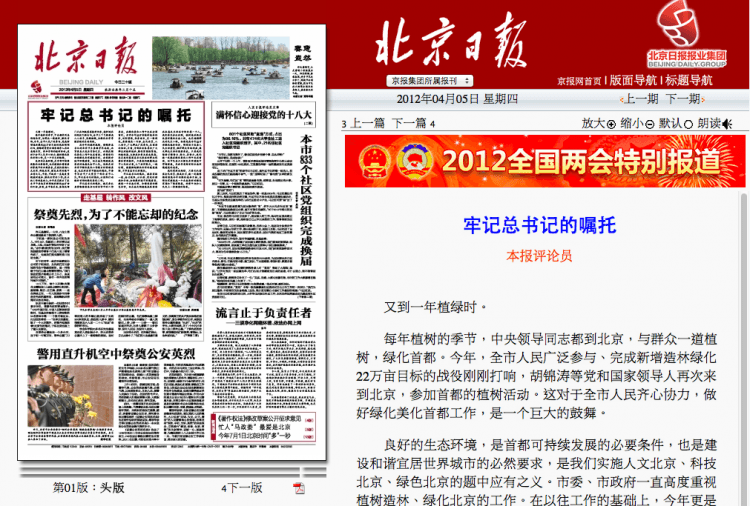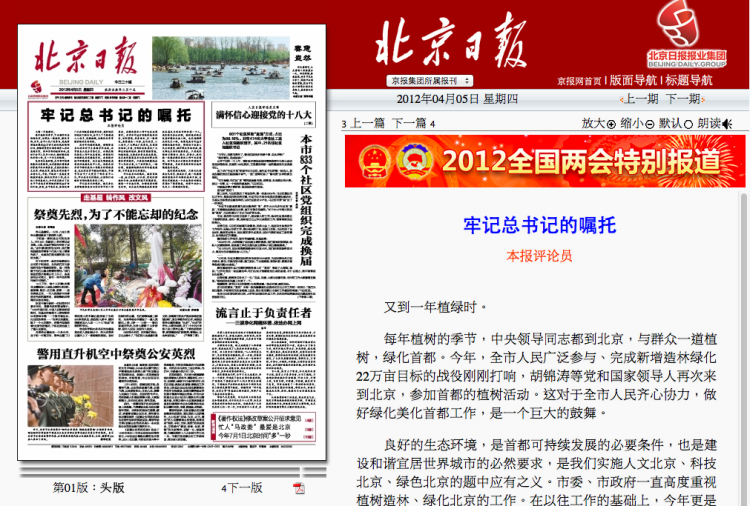The top political commissar at the Beijing Daily, the official mouthpiece of the Communist Party committee in the city, was demoted recently, according to an official announcement. A source familiar with the circumstances said it was due to his role in the Daily’s lending support to ousted cadre Bo Xilai and making veiled criticisms of paramount leader Hu Jintao.
The announcement named another 100 officials at Beijing Daily and in the Beijing city administration who were also sacked, demoted, or promoted. The announcement came out toward the end of the meeting by top Chinese Communist Party (CCP) leaders at the seaside city of Beidaihe recently, according to the source. Important personnel changes usually follow such meetings. The news was released on Aug. 15, two days before the meetings concluded.
Party leaders meet in the city every summer for the final round of major horse trading ahead of the 18th National Party Congress, where a once-in-a-decade leadership change takes place at the Politburo and the Politburo Standing Committee, the highest ruling body in the country.
Mei Ninghua, went from secretary of the Party leadership group (dangzu) at the Beijing Daily, to vice secretary. According to a source familiar with the situation, the decision was made in large part due to Beijing Daily’s publishing of a report in late March that claimed the CCP’s “the general secretary should not be the highest authority over the Party’s Central Committee.”
Whether Mei was directly behind the articles is unclear, but as Party secretary he is responsible for political discipline at the publication.
That article said instead that “collective leadership should be emphasized,” which was interpreted as a slight against Hu Jintao during the initial stages of a power struggle that pitted a faction led by former CCP leader Jiang Zemin and his cohorts and another faction headed by Hu Jintao and Premier Wen Jiabao.
News of this split in the Party came to light after Bo Xilai’s second-in-command Wang Lijun attempted to seek asylum in a U.S. Embassy in February. In April Bo was ousted as CCP leader of the city of Chongqing.
At the time of the Beijing Daily report’s publication, Hu Jintao was in Cambodia and when he returned four days later, it was deleted from the website. An editorial, which said, “Keep firmly in mind the general secretary’s earnest instructions,” was run instead.
Yan Liqiang, the deputy director of the Publicity Department of the CCP Municipal Committee, was appointed head of the Beijing Daily Group, the source said. The former chief editor of the Beijing Youth Daily, which is said to be aligned with Hu Jintao’s faction, was appointed as vice publisher of the Beijing Daily.
In May, search terms related to the Beijing Daily were blocked on Weibo several times after it lead a propaganda campaign against the U.S. aid of blind Chinese activist Chen Guangcheng, who later defected. Chinese Internet users slammed the newspaper via social media sites, and censors pulled the term.
At the time, the China Media Project said the paper could be one of the focal points regarding the infighting among high-level CCP officials. “We could be witnessing the low-level competition of factional propaganda and media control,” it said.
Editor’s Note: When Chongqing’s former top cop, Wang Lijun, fled for his life to the U.S. Consulate in Chengdu on Feb. 6, he set in motion a political storm that has not subsided. The battle behind the scenes turns on what stance officials take toward the persecution of Falun Gong. The faction with bloody hands—the officials former CCP head Jiang Zemin promoted in order to carry out the persecution—is seeking to avoid accountability for their crimes and to continue the campaign. Other officials are refusing any longer to participate in the persecution. Events present a clear choice to the officials and citizens of China, as well as people around the world: either support or oppose the persecution of Falun Gong. History will record the choice each person makes.
The Epoch Times publishes in 35 countries and in 19 languages. Subscribe to our e-newsletter.
Click www.ept.ms/ccp-crisis to read about the most recent developments in the ongoing crisis within the Chinese communist regime. In this special topic, we provide readers with the necessary context to understand the situation. Get the RSS feed. Get the new interactive Timeline of Events. Who are the Major Players? ![]()






